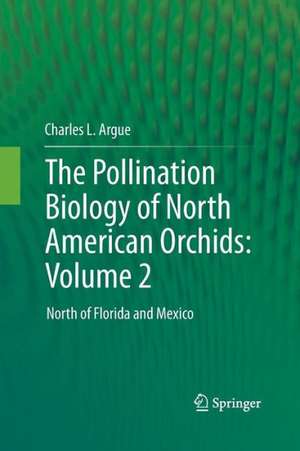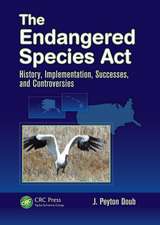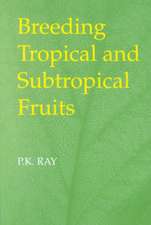The Pollination Biology of North American Orchids: Volume 2: North of Florida and Mexico
Autor Charles L. Argueen Limba Engleză Paperback – 26 noi 2014
This, the second of two volumes, treats the subfamily Orchidoideae with the tribe Cranichideae. This is followed by examination of the seven North American tribes of subfamily Epidendroideae and the single North American tribe of subfamily Vanilloideae.
The Pollination Biology of North American Orchids will be of interest to both regional and international audiences including:
- Researchers and students in this field of study who are currently required to search through the scattered literature to obtain the information gathered here.
- Researchers and students in related fields with an interest in the co-evolution of plants and insects.
- Conservation specialists who need to understand both the details of orchid reproduction and the identity of primary pollinators in order to properly manage the land for both.
- Orchid breeders who require accurate and current information on orchid breeding systems.
- General readers with an interest in orchid biology.
.
| Toate formatele și edițiile | Preț | Express |
|---|---|---|
| Paperback (1) | 995.02 lei 6-8 săpt. | |
| Springer – 26 noi 2014 | 995.02 lei 6-8 săpt. | |
| Hardback (1) | 1218.83 lei 6-8 săpt. | |
| Springer – 19 sep 2011 | 1218.83 lei 6-8 săpt. |
Preț: 995.02 lei
Preț vechi: 1213.44 lei
-18% Nou
Puncte Express: 1493
Preț estimativ în valută:
190.39€ • 199.50$ • 157.40£
190.39€ • 199.50$ • 157.40£
Carte tipărită la comandă
Livrare economică 11-25 aprilie
Preluare comenzi: 021 569.72.76
Specificații
ISBN-13: 9781489992345
ISBN-10: 1489992340
Pagini: 212
Ilustrații: IX, 202 p.
Dimensiuni: 155 x 235 x 11 mm
Greutate: 0.3 kg
Ediția:2012
Editura: Springer
Colecția Springer
Locul publicării:New York, NY, United States
ISBN-10: 1489992340
Pagini: 212
Ilustrații: IX, 202 p.
Dimensiuni: 155 x 235 x 11 mm
Greutate: 0.3 kg
Ediția:2012
Editura: Springer
Colecția Springer
Locul publicării:New York, NY, United States
Public țintă
GraduateCuprins
Subtribes Goodyrinae and Cranichidinae Goodyerinae.- Subtribe Spiranthinae.- Tribe Neottieae.- Tribe Triphoreae.- Tribe Malaxideae.- Tribe Calypsoeae.- Tribes Cymbidieae and Epidendreae.- Tribe Arethuseae (Calopogon R. Brown and Arethusa L.) and subfamily Vanilloideae (part one) (Pogonia Jussieu).- Tribe Pogonieae.- Glossary
Recenzii
From the reviews:
“Argue presents an impressive, comprehensive, and modern summary of the state of knowledge on the pollination biology of all major orchid groups in North America. … the author has achieved his stated goal of providing a thorough treatment of the filed that will be of board interest to local and international researchers and students of pollination as well as orchid enthusiasts. … also contain critical information for conservation managers striving to conserve the precious orchid diversity of the region.” (Rod Peakall, The Quarterly Review of Biology, Vol. 88 (3), September, 2013)
“Argue presents an impressive, comprehensive, and modern summary of the state of knowledge on the pollination biology of all major orchid groups in North America. … the author has achieved his stated goal of providing a thorough treatment of the filed that will be of board interest to local and international researchers and students of pollination as well as orchid enthusiasts. … also contain critical information for conservation managers striving to conserve the precious orchid diversity of the region.” (Rod Peakall, The Quarterly Review of Biology, Vol. 88 (3), September, 2013)
Textul de pe ultima copertă
Recent studies have revealed remarkable complexity and diversity in orchid-pollinator relationships. These studies comprise a vast literature currently scattered in numerous, often obscure, journals and books. The Pollination Biology of North American Orchids brings together, for the first time, a comprehensive treatment of this information for all native and introduced North American orchids found north of Mexico and Florida. It provides detailed information on genetic compatibility, breeding systems, pollinators, pollination mechanisms, fruiting success, and limiting factors for each species. Distribution, habitat, and floral morphology are also summarized. In addition, detailed line drawings emphasize orchid reproductive organs and their adaptation to known pollinators.
This, the second of two volumes, treats the subfamily Orchidoideae with the tribe Cranichideae. This is followed by examination of the seven North American tribes of subfamily Epidendroideae and the single North American tribe of subfamily Vanilloideae.
The Pollination Biology of North American Orchids will be of interest to both regional and international audiences including:
This, the second of two volumes, treats the subfamily Orchidoideae with the tribe Cranichideae. This is followed by examination of the seven North American tribes of subfamily Epidendroideae and the single North American tribe of subfamily Vanilloideae.
The Pollination Biology of North American Orchids will be of interest to both regional and international audiences including:
- Researchers and students in this field of study who are currently required to search through the scattered literature to obtain the information gathered here.
- Researchers and students in related fields with an interest in the co-evolution of plants and insects.
- Conservation specialists who need to understand both the details of orchid reproduction and the identity of primary pollinators in order to properly manage the land for both.
- Orchid breeders who require accurate and current information on orchid breeding systems.
- General readers with an interest in orchid biology.
Caracteristici
Volume 2 contains three parts, Orchidoideae subgroups, Spiranthinae, Goodyerinae, and Cranichidinae; Epidendroideae subgroups, the Neottieae, Triphoreae, Malaxideae, Calypsoeae, Cymbidieae, Epidendreae, and Arethuseae; and Vanilloideae tribe Pogonieae Each part includes both an introductory section for each of the larger genera and a review of individual species within each genus The treatment of species or groups of closely related species has the same format and consists of five parts Includes supplementary material: sn.pub/extras



